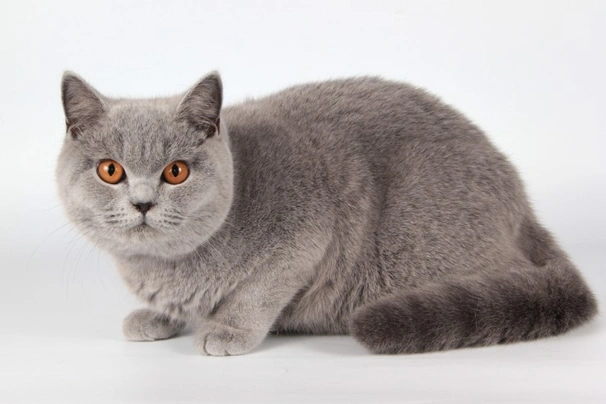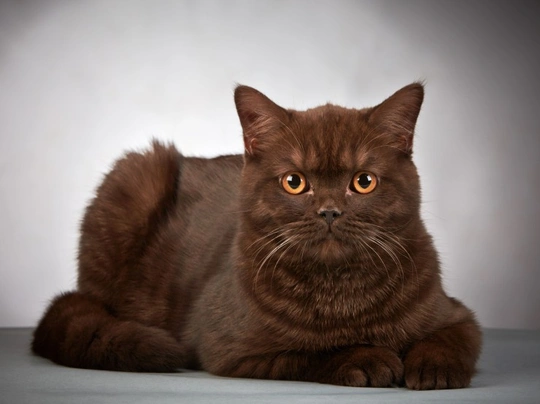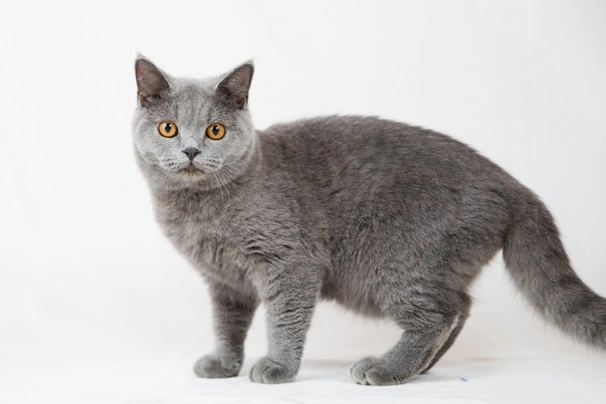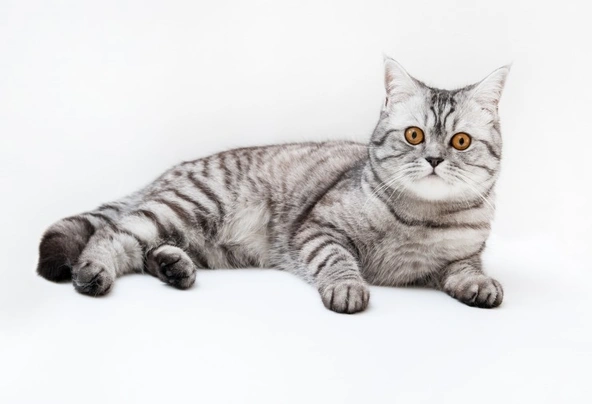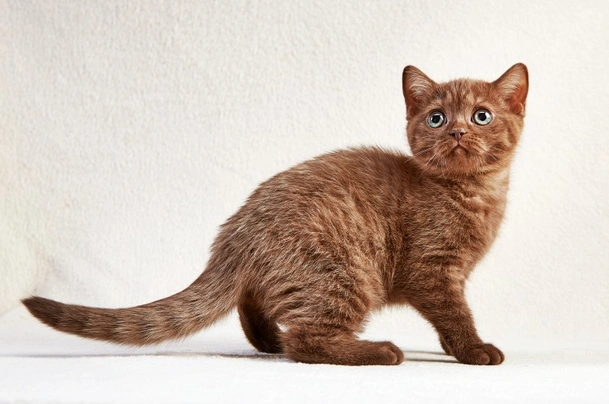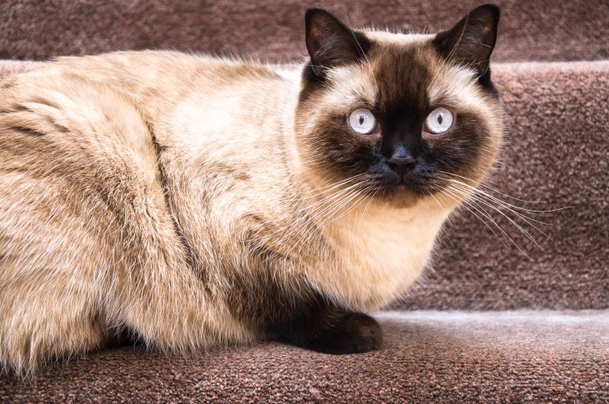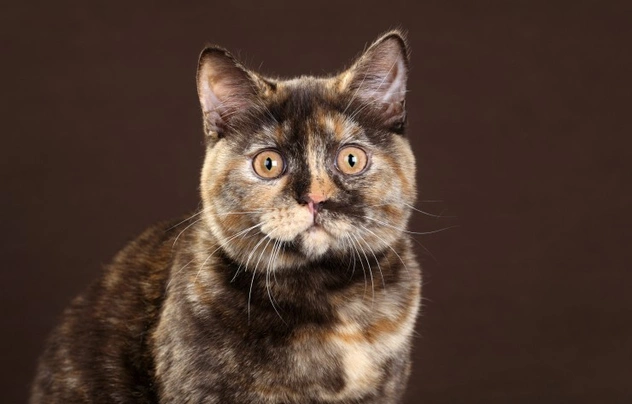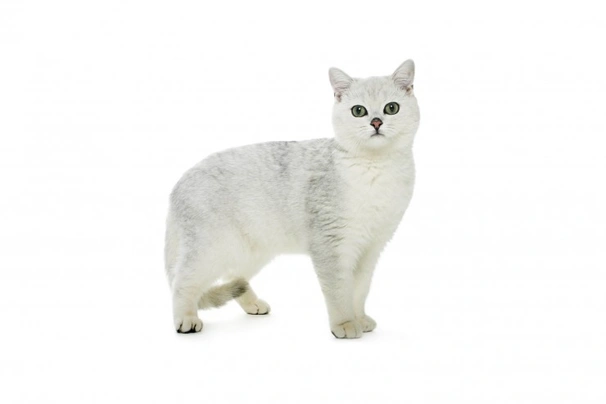British Shorthair
Introduction of the British Shorthair
British Shorthairs are one of the most popular pure breeds in the UK and for good reason. These lovely cats boast kind even-tempered personalities and they form extremely strong bonds with their families. The added bonus being that British Shorthairs get on with everyone including other pets and dogs which when paired to their independent yet loving loyal natures makes them the perfect family pet.
Since 1997 it has consistently been the most popular breed of pedigree cat in Britain by a long way in terms of numbers registered with the Governing Council of the Cat Fancy (GCCF).
History of the British Shorthair
During the Roman invasion many cats were introduced into the UK as a way of helping to control vermin. Over time cats the Romans bought with them mated with wild native cats and the result of these pairings was a native domestic cat. However it was only in 1870 that the British Shorthair we see today was accepted as a breed and their popularity grew and grew from then onwards. However their numbers were devastated by the two World Wars which saw them drop so low after the Second World War that the breed virtually vanished altogether. Thanks to the efforts and dedication of breed enthusiasts the British Shorthair was saved from extinction by carefully introducing Persians Russian Blues Burmese as well as other pure breed and non-pedigree shorthair cats into the mix.
One male cat called Brynbuboo Little Monarch was the first male British Shorthair to be given the GCCF title of Grand Champion. He went on to be one of the most popular stud cats back in the day and most British Shorthairs today can trace their ancestry back to him.
Appearance of the British Shorthair
British Shorthairs are well proportioned cats that boast a kind and sincere look about them which is one of the breed's most endearing features. They are known to have "teddy bear" looks with their large round expressive eyes and compact well-balanced powerful bodies. They have round faces and full cheeks with a good width between their ears. Noses are short broad and straight. When seen in profile cats have rounded foreheads showing a very slight nose break. They have firm strong and deep chins and perfectly level bites.
Their ears are small being nicely rounded at the tips and set well apart on a cat's rounded head. The outside of their ears are well covered with hair with only a small amount of furnishing on the inside of them. Eyes are large well opened and rounded being set nicely apart but without showing any Oriental shape to them.
The British Shorthair has a strong cobby body and short back. Chests are deep and they are big across their shoulders and rumps making them medium to large sized cats. Their legs are short and very strong with nice round firm paws and close fitting toes with five on each of their front feet but only four on their back feet. Tails are thick and moderately long being thicker at the base and boast having a rounded tip.
When it comes to their coat the British Shorthair has a short dense and crisp coat. The accepted colours for the breed under the GCCF standard are as follows:
British Self - all solid colours
- White - eyes orange or blue or one of each
- Black - eyes orange
- Blue - eyes orange
- Lilac - eyes orange
- Chocolate - eyes orange
- Red - eyes orange
- Cream - eyes orange
- Fawn - eyes orange
- Cinnamon - eyes orange
British Colourpointed and Colourpointed & White
These varieties boast having a coat pattern and the blue eyes of a Siamese
British Tipped
These varieties boast having coats that are coloured at the tips their eyes are generally green. The most commonly seen varieties are as follows:
- Black (silver) Tipped
- Golden (non-silver) Tipped
British Tortoiseshell Tortoiseshell & White Bi-Colour
These varieties boast having mixed colours. They may or may not have white in their coats which can either dominate or dilute a colour pattern
British Tabby
These varieties boast having tabby patterns in their coat that can be various colours and this includes silver. There are basically four tabby patterns which are as follows:
- Classic
- Spotted
- Mackerel
- Ticked
Temperament of the British Shorthair
The British Shorthair is known for their kind placid and affectionate nature. They love being involved in everything that goes on in their environment. They mature quite late which means they retain their kitten-like playfulness even as adult cats. They are also known to be very easy going laid back characters that generally get on well with everyone which includes dogs and other animals.
With this said British Shorthairs are not overly energetic and will happily lounge around the home if they can. They are not known to be very talkative cats but once they form a strong bond with a family this remains unbreakable throughout their lives and they are quick to let an owner know when it’s meal time. They love exploring the great outdoors but only if they live in a safe place. When kept as a pet in town they adapt very well to being kept as indoor pets providing they are given lots of attention and plenty of things to play with.
Because they are prone to put on weight very easily keeping a close eye on a cat's waistline is all important especially if a British Shorthair is not allowed outside. They are very intelligent cats and need enough stimulation to prevent them from becoming couch potatoes. Although not a lap cat the British Shorthair will happily sit on a newspaper when an owner is trying to read it or they like to lounge on a keyboard when people are trying to work on a laptop which is another endearing trait about the breed.
Intelligence / Trainability of the British Shorthair
The British Shorthair is an intelligent cat and as previously mentioned one that likes to be involved in everything that goes on in their household. They are quick to learn new things and love to have a daily routine which if changed can stress them out. As such it’s best to feed them at the same time every day and to keep to a cat’s routine as much as possible.
Children and other
British Shorthairs with their outgoing affectionate personalities are the perfect choice for families with children and this includes toddlers. Being smart cats they know when to get out of the way of smaller children when playtime starts to get too loud or too boisterous. However younger kids need to be taught how to behave and handle cats to avoid any mishaps. Any interaction between younger children and a cat should always be well supervised by an adult to make sure things stay nice and calm.
British Shorthairs also get on well with dogs providing they are good around cats that is. However care should be taken when introducing a British Shorthair to dogs they don't already know just in case the dog does not get on with their feline counterparts. It's always wiser to keep a close eye on any cat which includes British Shorthairs when they are around smaller pets just in case.
Health of the British Shorthair
The average life expectancy of a British Shorthair is between 14 and 20 years when properly cared for and fed an appropriate good quality diet to suit their ages.
The British Shorthair is known to suffer from a few hereditary health issues which are worth knowing about if you are planning share your home with one of these affectionate and loyal cats. The conditions that seem to affect the breed the most include the following:
- Polycystic Kidney Disease (PKD) - Breeders should have stud cats DNA tested
- Hypertrophic cardiomyopathy (HCM)
Caring for the British Shorthair
British Shorthairs need to be groomed on a regular basis to make sure their coats and skin are kept in top condition. On top of this cats need to be fed good quality food that meets all their nutritional needs throughout their lives which is especially true of young kittens and older cats.
Grooming of the British Shorthair
The British Shorthair boasts having short close lying coats and as such they are low maintenance on the grooming front. A weekly brush is all it takes to keep their coats in good condition and to remove loose and dead hair. Like other cats they tend to shed more profusely during the Spring and then again in the Autumn when more frequent brushing is usually necessary to keep on top of things.
It's also important to check a cat's ears on a regular basis and to clean them when necessary. If too much wax builds up it can lead to a painful infection which can be hard to clear up. In short prevention is often easier than cure with ear infections. Cats often suffer from ear mites which can be a real problem which is another reason why it's so important to check their ears on a regular basis.
Exercise of the British Shorthair
The British Shorthair is an easy going laid back cat. They like to play in short bursts in between napping during the day. With this said they are always ready and keen to play interactive games with the kids which is why they make such wonderful family pets.
Cats that are kept as indoor pets need to be given lots of things to do. They also need to have lots of places they can snuggle up for a snooze when the mood takes them because if there is one thing British Shorthairs are really good at it's napping during the day.
Feeding of the British Shorthair
If you get a British Shorthair kitten from a breeder they would give you a feeding schedule and it's important to stick to the same routine feeding the same kitten food to avoid any tummy upsets. You can change a kitten's diet but this needs to be done very gradually always making sure they don't develop any digestive upsets and if they do it's best to put them back on their original diet and to discuss things with the vet before attempting to change it again.
Older cats are not known to be fussy eaters but this does not mean they can be given a lower quality diet. It's best to feed a mature cat several times a day making sure it's good quality food that meets all their nutritional requirements which is especially important as cats get older. It's also essential to keep an eye on a cat's weight because if they start to put on too much it can have a serious impact on their overall health and wellbeing bearing in mind that if allowed a British Shorthair would quite happily turn into a couch potato. Like all other breeds British Shorthairs need to have free access to fresh clean water at all times.
British Shorthair price
If you are looking to buy a Shorthair you would need to pay anything from £150 to over £500 for a well-bred pedigree kitten. The cost of insuring a male 3-year-old British Shorthair in northern England would be £12.13 a month for basic cover but for a lifetime policy this would set you back £23.42 a month (quote as of Sept 2016). When insurance companies calculate a pet's premium they factor in several things which includes where you live in the UK a cat's age and whether they have been neutered or spayed among other things.
When it comes to food costs you need to buy the best quality food whether wet or dry making sure it suits the different stages of a cat’s life. This would set you back between £10 - £15 a month. On top of this you need to factor in veterinary costs if you want to share your home with a British Shorthair and this includes their initial vaccinations their annual boosters the cost of neutering or spaying a cat when the time is right and their yearly health checks all of which quickly adds up to over £500 a year.
As a rough guide the average cost to keep and care for a British Shorthair would be between £30 to £40 a month depending on the level of insurance cover you opt to buy for your cat but this does not include the initial cost of buying a well-bred kitten.

Adorable British Shorthair
£750
🏆 British shorthair kittens GCCF 🏆
£900

British Shorthair kittens
£550
